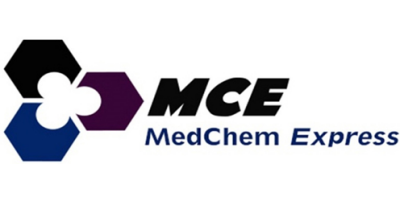

- Home
- Companies
- MedChemExpress LLC (MCE)
- Products
- MedChemExpress - Model UMI-77 - ...
MedChemExpress - Model UMI-77 - 518303-20-3
UMI-77 is a selective Mcl-1 inhibitor, which shows high binding affinity to Mcl-1 (IC50=0.31 μM). UMI-77 binds to the BH3 binding groove of Mcl-1 with Ki of 490 nM, showing selectivity over other members of anti-apoptotic Bcl-2 members.MCE products for research use only. We do not sell to patients.
UMI-77
MCE China:UMI-77
Brand:MedChemExpress (MCE)
Cat. No.HY-18628
CAS:518303-20-3
Purity:99.66%
Storage:Powder -20°C 3 years 4°C 2 years In solvent -80°C 6 months -20°C 1 month
Shipping:Room temperature in continental US; may vary elsewhere.
Description:UMI-77 is a selective Mcl-1 inhibitor, which shows high binding affinity to Mcl-1 (IC50=0.31 μM). UMI-77 binds to the BH3 binding groove of Mcl-1 with Ki of 490 nM, showing selectivity over other members of anti-apoptotic Bcl-2 members.
In Vitro:Competitive binding curve of UMI-77 against Mcl-1 is obtained by FP based binding assay using fluorescent labeled Bid BH3 peptide with an IC50 of 1.87±0.22 μM. UMI-77 potently inhibits the cell growth of BxPC-3 and Panc-1 cell lines with IC50 values of 3.4 μM and 4.4 μM respectively, and shows 3 to 5 times less potency in inhibition of the cell growth of two other tested cell lines MiaPaCa-2 (12.5 μM) and AsPC-1 (16.1 μM). The cell growth inhibition potency of UMI-77 correlates with the highest expression of Mcl-1 and Bak, and lowest expression of Bcl-xL in the sensitive cell lines, BxPC-3 and Panc-1. Capan-2 cells are showing similar sensitivity to UMI-77 (IC50 of 5.5 μM) as BxPC-3 and Panc-1, although has low Mcl-1 levels[1].
In Vivo:UMI-77 exhibits moderate metabolic stability with a half-life of 45 minutes.The maximum tolerated dose (MTD) of UMI-77 in SCID mice is determined. Administered 60 mg/kg i.v. for 5 consecutive days per week for two weeks does not cause any loss in the animal weight and there is no obvious sign of toxicity during the course of the treatment. Increasing the dose to 80 mg/kg show severe animal weight loss (>20%), therefore 60 mg/kg is used as a therapeutic dose for the in vivo efficacy studies. Daily treatment with UMI-77 for 5 consecutive days a week for two weeks results in statistically significant tumor growth inhibition by 65% and 56% in comparison with the controls in day 19 (p[1].
Animal Administration:Mice[1] For BxPC-3 subcutaneous model, 10×106 cells are subcutaneously injected into the flanks of 4-5 week old female severe combined immune deficient mice (ICR-SCID). Palpable tumors start to appear in 3-5 weeks. Tumors are measured twice weekly. To prevent any pain or discomfort, mice are euthanized and their tumors remove once they reach ~1800 mg burden. Tumors are then dissected into 50 mg pieces and re-transplanted into naïve ICR-SCID for serial propagation. Animals are treated with either vehicle or UMI-77 given i.v. (60 mg/kg) on day three post BxPC-3 transplantation for two weeks (5 days a week). Tumor weight is recorded throughout the treatment period. At the end of the treatment period, animals are euthanized and their tumors harvested for protein isolation and western blot analysis for apoptotic markers.
Cell Assay:Human PC cell lines AsPC-1, BxPC-3 and Capan-2 are cultured in RPMI 1640 medium, while Panc-1 and MiaPaCa are cultured in DMEM medium, all supplemented with 10% fetal bovine serum. The cell growth inhibition after treatment with increasing concentrations of the compounds (e.g., UMI-77; 1,10, and 100 μM) is determined by WST-8 assay[1].
IC50 & Target:Mcl-1 0.49 μM (Ki) Bfl-1 5.33 μM (Ki) Bcl-W 8.19 μM (Ki) Bcl-2 23.83 μM (Ki) Bcl-xL 32.99 μM (Ki)
Hot selling product:Monensin sodium salt | Scutellarin | Ganciclovir | Lorlatinib | Tanshinone IIA | Trilaciclib | CTB | Ramucirumab | GB-88 | Ripretinib
Trending products:Recombinant Proteins | Bioactive Screening Libraries | Natural Products | Fluorescent Dye | PROTAC | Isotope-Labeled Compounds | Oligonucleotides
References:
[1]. Abulwerdi F, et al. A novel small-molecule inhibitor of mcl-1 blocks pancreatic cancer growth in vitro and in vivo. Mol Cancer Ther. 2014 Mar;13(3):565-575. [Content Brief]
Brand introduction:
• MCE (MedChemExpress) has a global exclusive compound library of more than 200 kinds, and we are committed to providing the most comprehensive range of high-quality small molecule active compounds for scientific research customers around the world;
• More than 50,000 highly selective inhibitors and agonists are involved in various popular signaling pathways and disease areas;
• The products cover a variety of recombinant proteins, peptides, commonly used kits, more PROTAC, ADC and other characteristic products, widely used in new drug research and development, life science and other scientific research projects;
• Provide virtual screening, ion channel screening, metabolomics analysis detection analysis, drug screening and other professional technical services;
• It has a professional experimental center and strict quality control and verification system;
• Provide LC/MS, NMR, HPLC, chiral analysis, elemental analysis and other quality inspection reports to ensure the high purity and high quality of products;
• The biological activity of the products has been verified by the experiments of customers in various countries;
• A variety of top journals such as Nature, Cell, Science and pharmaceutical patents have included the scientific research results of MCE customers;
• Our professional team tracks the latest pharmaceutical and life science research and provides you with the latest active compounds in the world;
• It has established long-term cooperation with the world's major pharmaceutical companies and well-known scientific research institutions。
